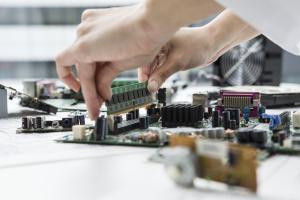Why Study Nanotechnology?
- We are one of the very few universities in the UK to offer hands-on time fabricating devices in a clean room environment and operator time on laser micro-machining equipment.
- Our research areas cover all aspects of nanotechnology, including device design, fabrication and measurements. Our nanofabrication facilities situated in our semiconductor microfabrication cleanroom, together with the collective expertise of our staff in nanophotonics, nanoelectronics nanofabrication offers a unique combination of theoretic and practical training to prepare students for a successful career in this exciting field of work.
- We have a long history of expertise in electronic engineering.
- Electronic Engineering at Bangor is ranked 4th in the UK for Research Outputs.
- You will have access to state-of-the-art laboratory facilities. We have several high-tech research laboratory areas.
- We have a lively Postgraduate community.
- You will be taught by staff who are experienced electronic engineers and who maintain links with industry to ensure that what you are learning is up to date and relevant for industry.
Career Opportunities in Nanotechnology
Nanotechnology and Microfabrication offers an effective combination of physical science, mathematical simulation and hands-on experience in microfabrication skills and will prepare students for a wide range of career options, as well as opportunities for further PhD study.
Companies working in the high-speed electronics, integrated photonics and bioengineering will constantly require highly trained staff in the Nanotechnology and Microfabrication fields. Some graduates will design the latest version of telecommunications chips, while others will develop new photonic chips for LIDAR and self-driving cars. The biosensing and bioengineering arena, in particular, is constantly in need of expertise spanning across the areas mentioned above.
Studying nanotechnology requires a great deal of specialist research equipment, these skills are highly specialised and extremely desirable to employers. We have a long history of electronics and photonics expertise and the infrastructure, to allow us to deliver such specialised degrees.
You may also be interested in these related subject areas.
You may also be interested in these related subject areas.







